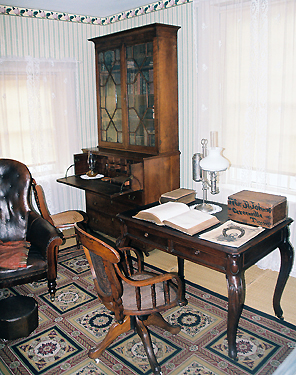JUNE 13, 1865:
Civil government is re-established by Executive
Order in Mississippi and in Georgia.
 |
| President Johnson's Executive desk |
Robert
E. Lee receives word that he, along with Jefferson Davis and other Confederate
leaders is going to be indicted for treason. He writes to General Grant:
. . . Upon reading the President's proclamation
of the 29th ult., I came to Richmond to ascertain what was proper or
required of me to do, when I learned that, with others, I was to be indicted
for treason by the grand jury at Norfolk. I had supposed that the officers and
men of the Army of Northern Virginia were, by the terms of their surrender,
protected by the United States Government from molestation so long as they
conformed to its conditions. I am ready to meet any charges that may be
preferred against me, and do not wish to avoid trial; but, if I am correct as
to the protection granted by my parole, and am not to be prosecuted, I desire
to comply with the provisions of the President's proclamation, and, therefore,
inclose the required application, which I request, in that event, may be acted
on. I am, with great respect . . .

Attached
is the following petition to President Johnson:
. . . Being excluded
from the provisions of the amnesty and pardon contained in the proclamation of
the 29th ult., I hereby apply for the benefits and full restoration of all
rights and privileges extended to those included in its terms. I graduated at
the Military Academy at West Point in June, 1829; resigned from the United
States Army, April, 1861; was a general in the Confederate Army, and included
in the surrender of the Army of Northern Virginia, April 9, 1865. I have the
honor to be, very respectfully . . .
In
Dublin, Ireland, William Butler Yeats is born.




